Best Open Source Note-Taking Software to Stay Organized: Staying organized in today’s fast-paced digital era is key to productivity, and one effective method to do this is through efficient note taking. No matter what stage in life you find yourself at, open source note-taking software offers a convenient and flexible solution to keeping track of your thoughts. Finding the appropriate tool can significantly strengthen your organizational abilities. There is an abundance of choices out there to meet different preferences and needs, making finding one all the more essential.
This article highlights 20 of the best open source note-taking software options to help users organize their thoughts efficiently, collaborate without issues, and maintain an organized digital workspace. From feature-packed applications to minimalist platforms, this list aims to navigate you through the vast landscape of open source note-taking tools in search of one that best meets your productivity needs and keeps ideas well organized.
Why To Choose Best Open Source Note-Taking Software to Stay Organized?
Selecting an open source note-taking software is a critical strategic decision that has long-term effects for personal and professional organization. Consider open source solutions as they offer more than convenience; they also provide users with flexibility, security, and collaborative capabilities that cannot be found elsewhere. Open source note-taking software enables users to tailor it specifically to meet their individual organizational needs, providing a more customized and efficient organizational system. Open source projects foster a sense of trust among their users because their code can be examined for security vulnerabilities, providing peace of mind that there are no hidden agendas behind the code.
As collaboration becomes more digital and remote, sharing and working on notes seamlessly is increasingly crucial to teamwork. In this article, we explore why selecting the ideal open source note-taking software is such an intelligent decision – exploring its contributions to increased productivity, data privacy protection and an overall better digital lifestyle.
- Advertisement -
Here Is The List Of Best Open Source Note-Taking Software to Stay Organized
- Joplin (Best Open Source Note-Taking Software to Stay Organized)
- Standard Notes
- QOwnNotes
- Turtl
- Laverna (Best Open Source Note-Taking Software to Stay Organized)
- Simplenote
- Tomboy
- CherryTree
- Zim
- Boostnote (Best Open Source Note-Taking Software to Stay Organized)
- Trilium Notes
- MedleyText
- TagSpaces
- Xournal++
- NixNote (Best Open Source Note-Taking Software to Stay Organized)
- Emacs Org Mode
- TiddlyWiki
- Paperwork
- NoteCase Pro
- KeepNote (Best Open Source Note-Taking Software to Stay Organized)
20 Best Open Source Note-Taking Software to Stay Organized
1. Joplin (Best Open Source Note-Taking Software to Stay Organized)
Joplin stands out as an impressive and versatile open-source note-taking software, excelling in helping users maintain organization and productivity. Compatible across platforms (Windows, macOS, Linux, Android and iOS), Joplin facilitates seamless synchronization across devices. Joplin stands out among its rivals by offering end-to-end encryption, guaranteeing that sensitive information remains protected. Furthermore, its markdown support enables easy formatting and customization of notes for easier categorizing purposes; and its robust tagging system facilitates efficient categorization.
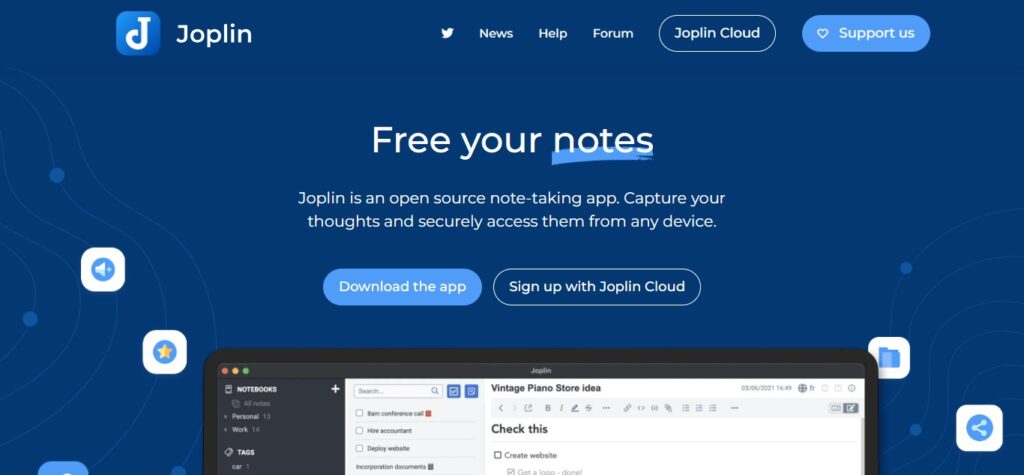
Joplin provides users with attachments, to-do lists, note import capability in multiple formats, cloud services such as Dropbox and Nextcloud integration for user flexibility in choosing their preferred storage solution – making Joplin an attractive open-source note-taking option suitable for students, professionals and anyone valuing an organized digital workspace.
2. Standard Notes
Standard Notes is an outstanding open-source note-taking software with a minimalist design and emphasis on security and privacy. Standard Notes is ideal for users who prioritize simplicity without compromising features, providing end-to-end encryption to protect user data in an encrypted fashion. Standard Notes is an intuitive application designed to help users organize their notes efficiently and supports markdown for easy formatting. Furthermore, its versatility extends into its extensions, offering features such as themes, editors and cloud synchronization options for even greater flexibility and convenience.
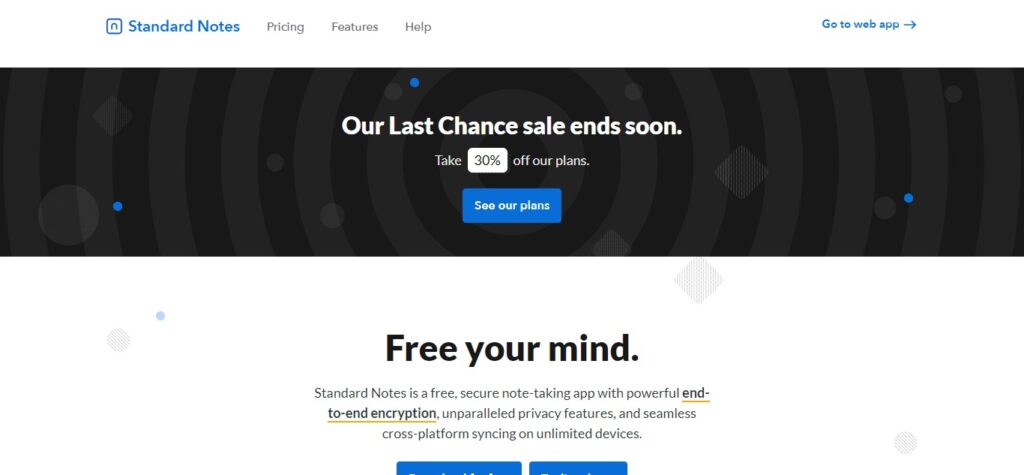
Standard Notes is an open-source solution available across platforms such as Windows, macOS, Linux, Android and iOS that provides a consistent note-taking experience across devices. Ideal for individuals seeking a dependable yet secure open source solution to stay organized with privacy in mind, Standard Notes makes an outstanding open-source choice that offers both functionality and privacy protection.
3. QOwnNotes
QOwnNotes is an open-source note-taking software developed with users in mind, designed to empower them in their pursuit of organization and productivity. Compatible with Windows, macOS and Linux OSes alike, QOwnNotes boasts an expansive feature set while still offering a clean user interface with easily customizable settings. One of its standout features is its seamless integration with Nextcloud, enabling users to synchronize notes across devices effortlessly.
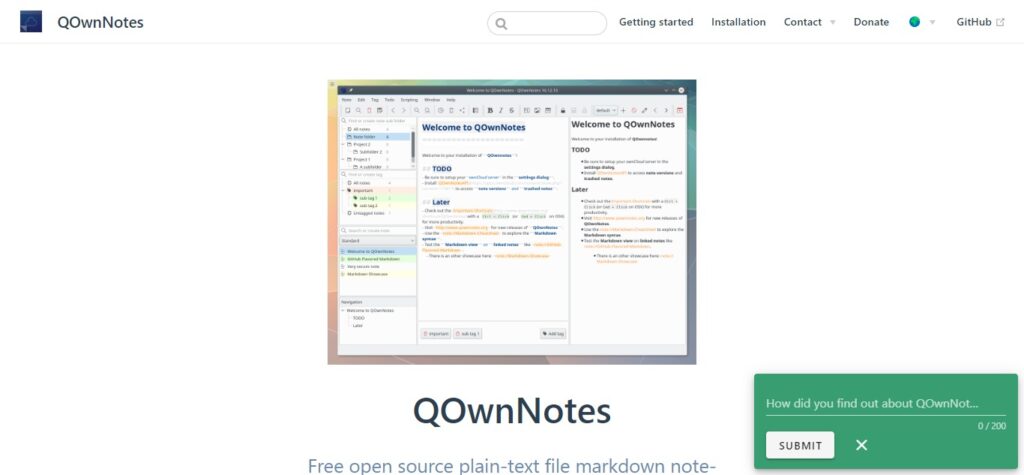
QOwnNotes supports Markdown for easy text formatting, and boasts advanced functionalities such as scripting and task management that make it an indispensable tool for a variety of users. QOwnNotes places great emphasis on user control, giving individuals complete customization and organization of their notes whether stored locally or online. Customizability and organization remain in the hands of each user – perfect for those who value flexibility, security, and a rich feature set in an open-source note-taking app such as QOwnNotes.
4. Turtl
Turtl stands out as a prominent open-source note-taking software, boasting an innovative blend of organization, security, and collaborative features. Turtl is an easily accessible note-making solution suitable for Windows, macOS, Linux, Android and iOS users that enables them to create and manage notes through an appealing and user-friendly interface. Turtl’s unique offering lies in its dedication to privacy, using client-side encryption technology to safeguard user data against third party access.

Turtl’s open source solution prioritizes both organization and security for users who require an organized note-taking platform with secure privacy controls. Users can not only store notes but bookmarks, passwords and images securely in one centralized digital workspace. Collaborators can share boards and notes while keeping teamwork flowing while upholding privacy. Turtl provides users with reliable note-taking functionality suited for team collaboration as well as providing team privacy controls.
5. Laverna (Best Open Source Note-Taking Software to Stay Organized)
Laverna is an outstanding open-source note-taking software designed to streamline organization and productivity for its users in an intuitive fashion. Laverna’s compatibility with various platforms, including Windows, macOS, Linux and web browsers enables it to offer users a clean and minimalist note-taking interface that’s optimized for efficient note taking. One key feature it boasts is end-to-end encryption ensuring user data stays private and safe. Laverna offers Markdown support for easy text formatting and provides a distraction-free environment in which content creation can take place.
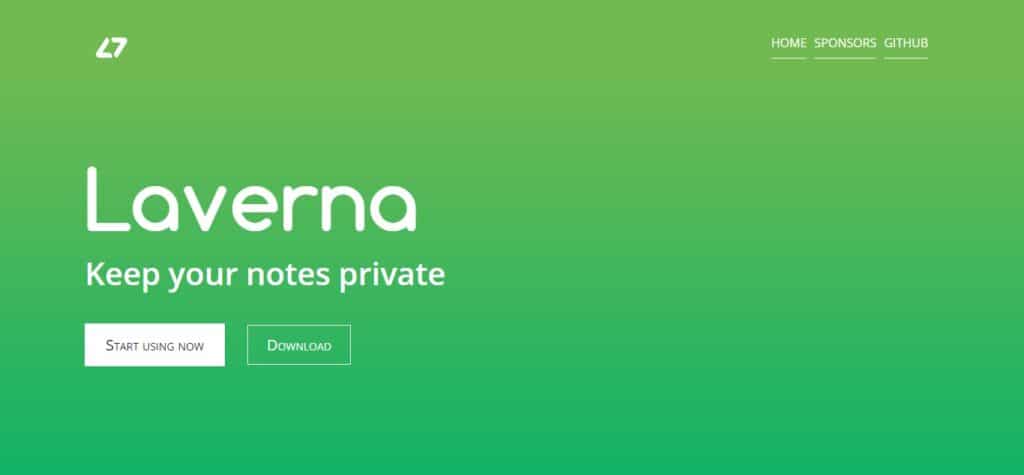
Though its simple, Laverna still includes essential features like tagging, searching, and organizing notes into notebooks. Laverna’s ability to sync notes with cloud storage services offers convenience across devices. For those seeking simplicity without forgoing essential features, Laverna represents an outstanding open-source choice for staying organized digitally.
6. Simplenote
Simplenote’s name and design philosophy capture the spirit of open-source note taking software which prioritizes accessibility for effective organization. Simplenote is available across multiple platforms – Windows, macOS, Linux, Android and iOS. With its clean user-friendly interface and straightforward approach, Simplenote allows users to effortlessly create and organize notes. Simplenote offers seamless accessibility of notes across devices for an unparalleled user experience.
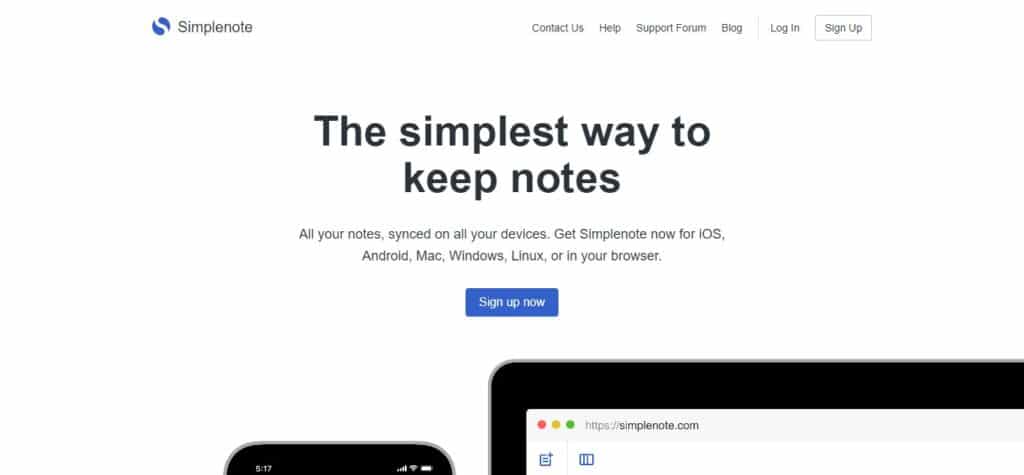
While remaining minimalistic in its design, Simplenote boasts powerful search and tagging functionality to enable users to efficiently categorize and retrieve their notes. As an open-source note-taking solution, Simplenote serves as a reliable platform for those seeking a straightforward yet robust tool to stay organized in their digital ventures.
7. Tomboy
Tomboy is an easy and accessible open-source note-taking software, making it the ideal solution for users seeking an effortless yet efficient means of staying organized. Tomboy provides an easy and intuitive interface for creating and organizing notes across Linux, Windows, and macOS systems. The application offers quick and intuitive solutions for digital organization. Tomboy stands out with its wiki-style linking system, enabling users to interlink notes for a more cohesive information structure.
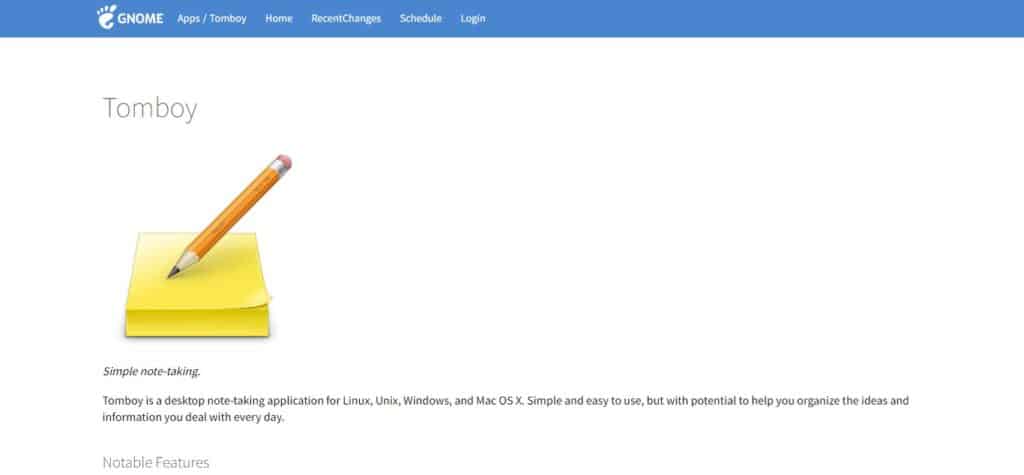
Furthermore, with features like note synchronization and basic formatting support available within Tomboy, it provides users with both functionality and simplicity in one application. Tomboy’s lightweight design makes it accessible to a range of users – from students to professionals – who value an accessible and open-source note-taking app in order to sharpen organizational skills. Tomboy is an efficient solution that meets these criteria.
8. CherryTree
CherryTree stands out as an impressive open-source note-taking software with many advanced features, providing users who demand an efficient way to stay organized with powerful organizational features and simple hierarchical notes structures while offering robust editing features. Available on Linux, Windows and macOS systems – CherryTree offers seamless organization by combining hierarchical note structures with powerful editing options for an efficient note taking experience.
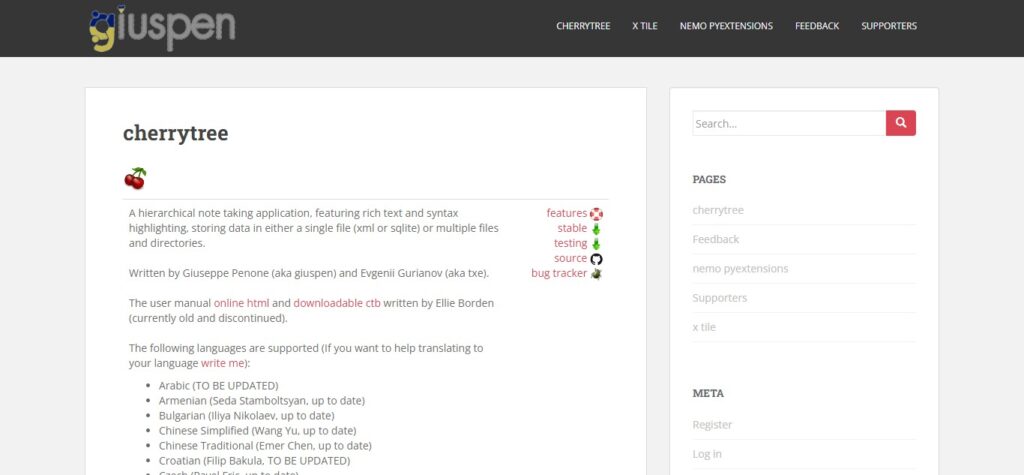
This application supports rich text formatting, code highlighting and the inclusion of images – making it suitable for various forms of content creation. CherryTree’s hierarchical tree structure allows users to organize notes hierarchically, making complex outlines and documentation much simpler. Portability and encryption provide additional flexibility and security; file attachment support as well as export in various formats make CherryTree an all-inclusive note-taking solution that emphasizes structure over content.
9. Zim
Zim is an open-source note-taking software which excels in offering users a structured yet intuitive environment in which to stay organized. Compatible with Linux, Windows, and macOS operating systems alike, Zim combines an easy wiki-style interface with powerful note editing features for ultimate organization. Zim offers a hierarchical structure, enabling users to create notebooks with interlinked pages for seamless information flow. Rich text editing capabilities – including including images and attachments – makes Zim suitable for multiple content types.
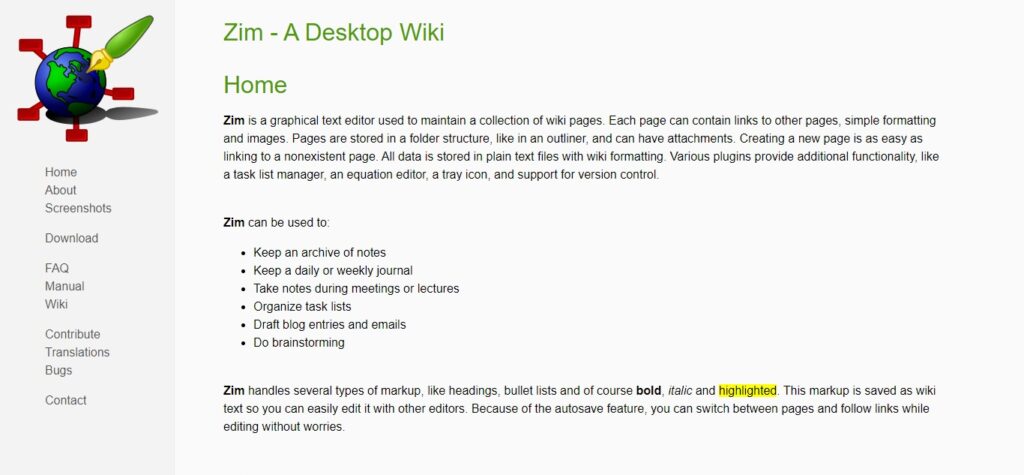
Zim is an open source note taking application with version control capabilities that enables users to track changes and return to previous states, improving collaboration and accountability. With an intuitive user interface that enables exporting notes in various formats, Zim caters to those in search of flexible note taking while keeping an organized digital workspace.
10. Boostnote (Best Open Source Note-Taking Software to Stay Organized)
Boostnote is an open-source note-taking software tailored to meet the needs of developers, students and professionals who require a customizable organizational solution. Boostnote, available for Windows, macOS, and Linux operating systems, provides an ideal environment for code snippets and markdown notes, making it particularly attractive to those involved with programming. The application offers syntax highlighting for multiple programming languages, creating an organized space to store code-related notes.
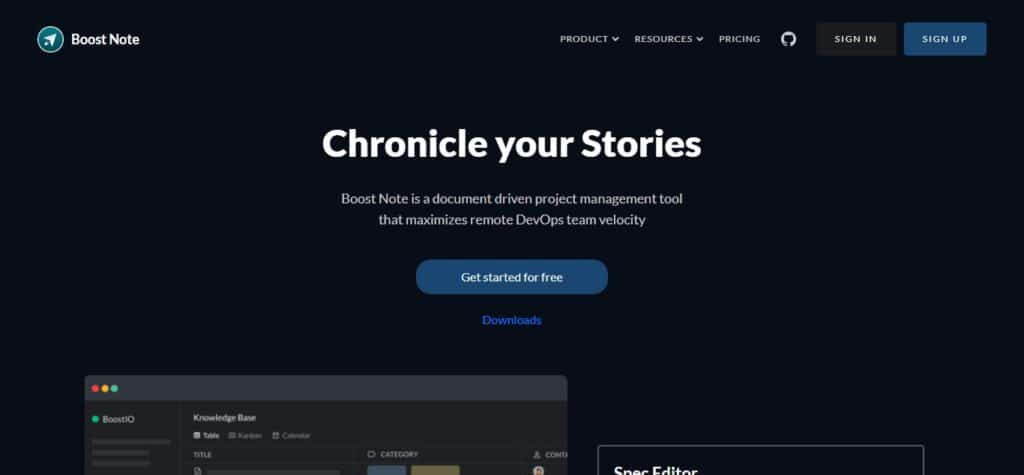
Boostnote offers a user-friendly and intuitive interface, and supports tags, folders and an advanced search function for efficient categorization and retrieval of information. Synchronization capabilities ensure seamless access across devices – perfect for coders looking for an open-source note-taking platform; yet powerful enough to keep thoughts and code organized at the same time!
11. Trilium Notes
Trilium Notes is an open-source note-taking software with the goal of increasing organization and productivity. Compatible with Windows, Linux, and macOS operating systems, Trilium Notes stands out with its innovative hierarchical note organization system. This application employs a node-based structure, enabling users to easily create interlinked notes – an invaluable asset when it comes to creating complex outlines or detailed documentation.
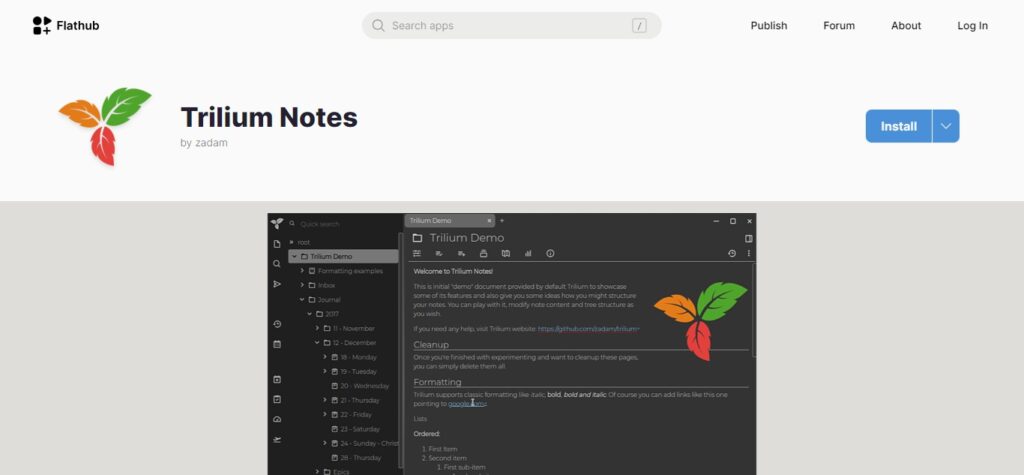
Trilium Notes provides rich text editing capabilities, including embedding images and files, with an efficient tagging system for categorization purposes. Furthermore, Trilium’s web-based interface ensures accessibility across various devices. Trilium Notes prioritizes privacy by offering self-hosting options, giving users full control of their data. As an open-source platform that emphasizes interconnected hierarchical note-taking, Trilium Notes makes an appealing solution.
12. MedleyText
MedleyText is an open-source note-taking software with an elegant user experience, designed to keep users organized and productive. Available for Windows, macOS and Linux users alike, MedleyText emphasizes simplicity without compromising essential features. Markdown support makes text formatting simple, and provides a distraction-free environment to ensure a seamless note-taking experience. One standout feature of Evernote is its interlinked note creation capability which creates a network of thoughts.
MedleyText allows users to effortlessly link and navigate between notes, allowing for the organization of ideas and projects. Boasting an easy-to-use and responsive interface, MedleyText appeals to users who prefer an efficient yet straightforward note-taking experience while creating an organized digital workspace.
13. TagSpaces
TagSpaces is an innovative open-source note-taking software with an innovative way of organizing using tags and metadata. TagSpaces is compatible with Windows, macOS, Linux, Android, and iOS, enabling users to tag their notes and files easily based on specific topics or themes for quick categorization and retrieval. TagSpaces provides a user-friendly visual and intuitive interface, enabling users to organize their notes according to their workflow.
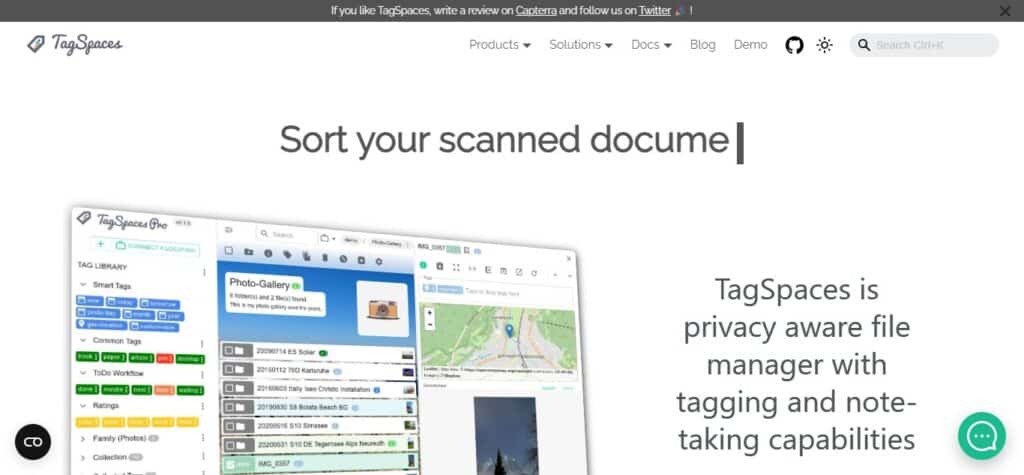
With TagSpaces, users can build personalized digital environments which improve information retrieval. TagSpaces supports markdown for text formatting and allows users to store notes either locally or in cloud storage, providing accessibility across devices. Individuals looking for an agile yet tag-based approach to note-taking and organization will find TagSpaces an appealing open-source option.
14. Xournal++
Xournal++ is an open-source note-taking software specifically tailored for those who enjoy digital notebook experiences. Compatible with Linux, Windows and macOS operating systems, this versatile note-taking application enables annotating PDFs, taking handwritten notes and sketching ideas – among many other uses! Xournal++ offers an intuitive user experience and extensive list of tools, making it a valuable resource for users who require both traditional and digital note taking capabilities.
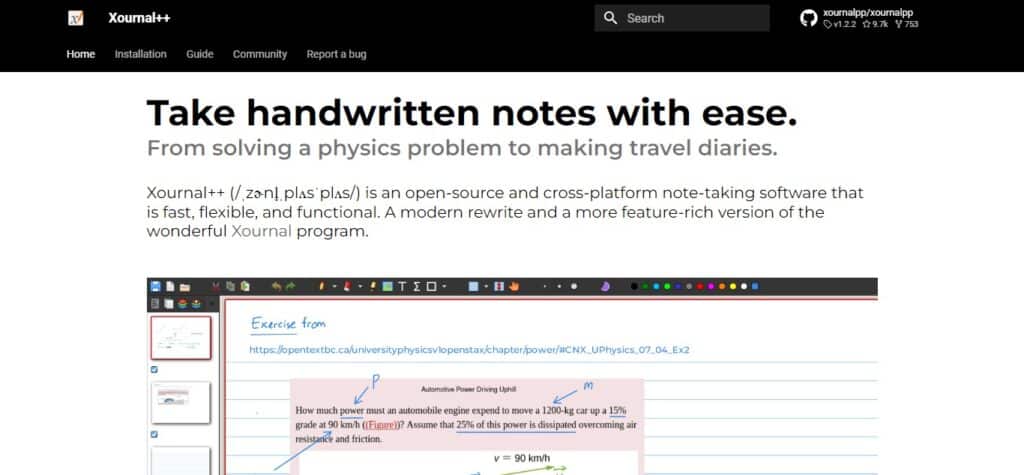
Furthermore, its support for various file formats enables easy import/export. Xournal++ software has become immensely popular with students, artists, and professionals due to its intuitive stylus input handling and ability to produce dynamic multimedia notes. If you want an open-source solution that offers both handwritten note feel with digital organization capabilities then Xournal++ may offer just what you’re looking for – to stay organized while being creative at once.
15. NixNote (Best Open Source Note-Taking Software to Stay Organized)
NixNote, formerly known as Nevernote, is an open-source note-taking software designed to keep users organized by seamlessly integrating with Evernote – one of the leading note-taking platforms available today. NixNote, compatible with Windows, Linux and macOS operating systems, gives users access to Evernote notes synchronization for cross-platform accessibility of information.
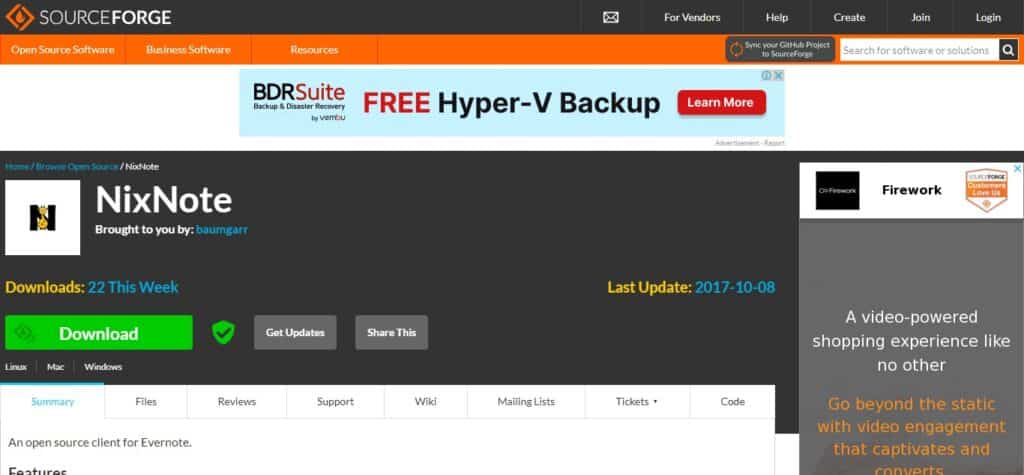
Evernote for iPad retains the familiar interface and features, as well as new functionalities and improvements, but with enhanced functionalities and upgrades. Users can create, edit, and organize notes – including attachments, tags and notebooks – using this application. NixNote offers an offline mode, enabling users to access their notes even when not connected to the internet. As an open-source alternative to Evernote, this open-source solution provides individuals who require feature-rich cross-platform storage solutions for managing digital information effectively.
16. Emacs Org Mode
Emacs Org Mode is an extremely flexible open-source note taking and organization system incorporated within Emacs text editor. Org Mode stands out as an indispensable text-based workflow tool, transcending traditional note taking by seamlessly incorporating task management, outlining, and time tracking features into its solution. Org Mode is compatible with Linux, Windows, and macOS and utilizes plain text files for version control and easy collaboration. Its extensive features include outlining abilities, tables, tags and dynamic documents with embedded code snippets.
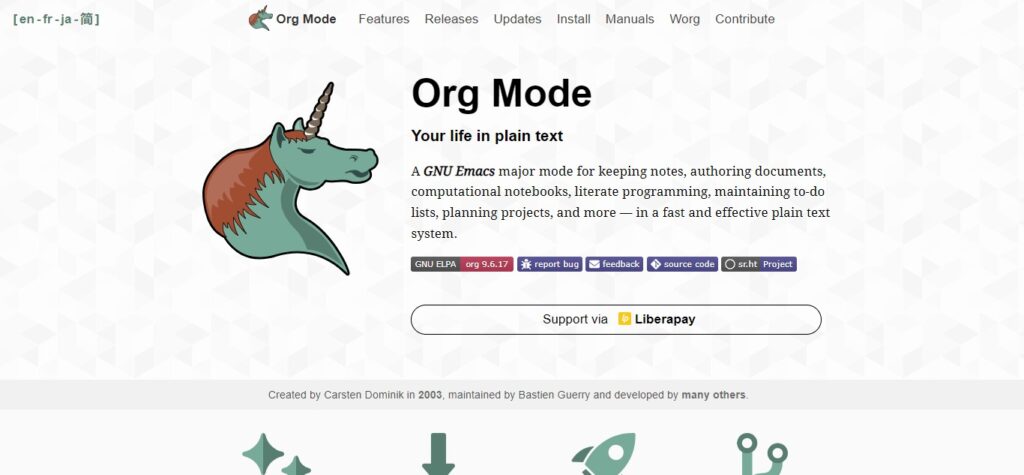
Org Mode stands out as an efficient note-taking and organization solution thanks to its user-friendly syntax, integration with Emacs and robust open-source support. Perfect for both personal and collaborative productivity projects alike, Org Mode’s simplicity yet power make it an attractive option that helps users remain organized within text-driven environments.
17. TiddlyWiki
TiddlyWiki stands out as an innovative open-source note-taking software, reinventing the concept of personal wikis with its flexible format. Running entirely within an HTML file, TiddlyWiki can be hosted either locally or remotely across several web servers. TiddlyWiki is compatible with major web browsers, including Chrome, Firefox and Safari, offering users a customizable and extensible platform to create interlinked notes known as tiddlers.
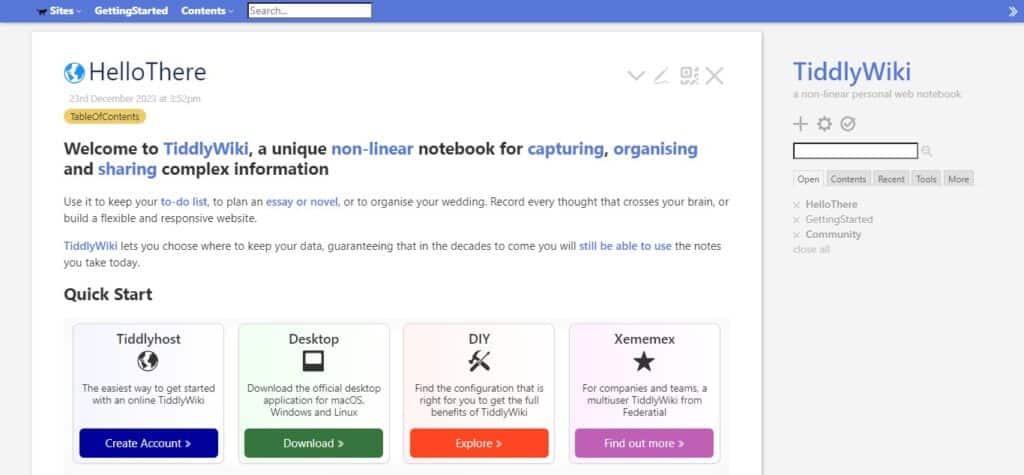
TiddlyWiki allows users to easily link and organize these tiddlers, creating an organized knowledge base. TiddlyWiki excels at being adaptable; users can customize their experience by adding plugins or themes; making this open-source tool especially appealing to individuals seeking a flexible note-taking solution while creating their personalized and interconnected digital workspace.
18. Paperwork
Paperwork is an open-source note-taking software created to give users a reliable digital workspace. Paperwork, designed for Windows, Linux, and macOS compatibility, combines note-taking capabilities with document management for a comprehensive solution for both individuals and businesses alike. Paperwork provides an intuitive user interface, making it simple for users to create, organize, and categorize notes and documents easily. Paperwork supports adding tags for easier categorizing of information as well as powerful search features that quickly locate information needed.
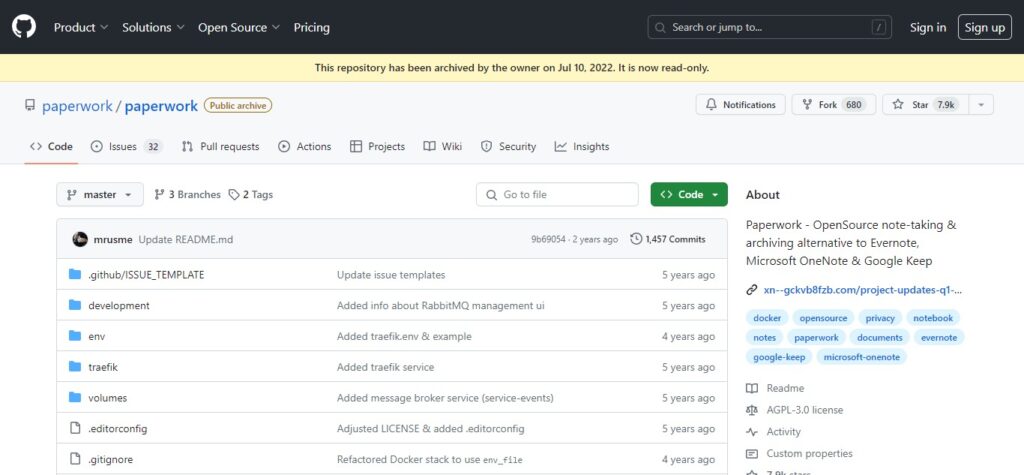
Paperwork’s software also supports file attachments, making it an effective means of organizing various forms of digital content. Ideal for both personal and collaborative endeavors alike, Paperwork provides an user-friendly environment filled with features for staying organized in all their digital endeavors.
19. NoteCase Pro
NoteCase Pro is an open-source note-taking application with powerful and feature-packed capabilities that goes far beyond simple organization. NoteCase Pro provides a hierarchical structure for organizing notes, enabling users to easily create complex outlines and structured documentation. Compatible with Linux, Windows and macOS operating systems. Its user-friendly interface offers flexible text formatting options and allows the addition of images for content creation.
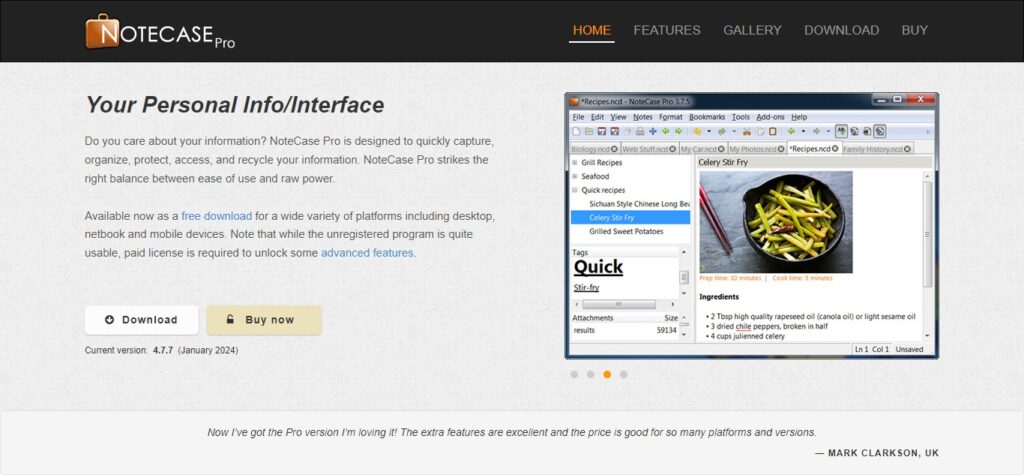
NoteCase Pro offers advanced features like task management, bookmarking, and the capability of attaching files directly to notes – ideal for users with diverse organizational needs. NoteCase Pro provides users with encryption support and synchronization features that empower them to manage their notes with confidence, assuring data security and accessibility across devices. Perfect for personal or collaborative projects alike, NoteCase Pro stands out as an open-source solution which equips users to maintain an orderly digital workspace.
20. KeepNote (Best Open Source Note-Taking Software to Stay Organized)
KeepNote is a user-friendly, open-source note taking software designed to maximize organization and productivity. Compatible with Windows, Linux and macOS operating systems, KeepNote offers an accessible platform for creating hierarchical notes. Users can quickly and efficiently organize information into notebooks and subfolders to facilitate a streamlined approach to note taking. KeepNote supports text formatting, image embedding and the inclusion of hyperlinks making it suitable for various forms of content.
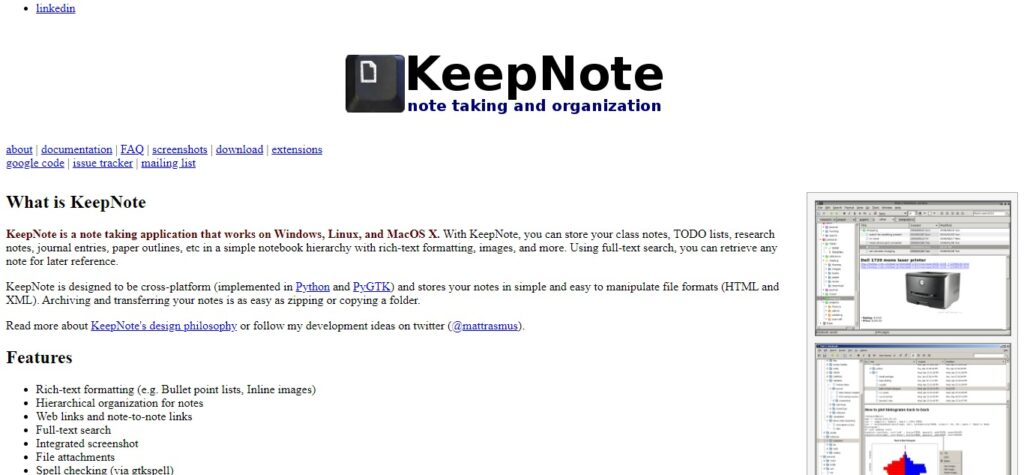
KeepNote is designed with its user in mind, boasting an easy-to-use and uncomplicated user interface for fast note creation and navigation. Users can easily create HTML or plain text export notes for added flexibility and convenience. Whether used for personal notes, research projects or project management – KeepNote’s accessibility makes it a reliable open-source solution that ensures an organized digital workspace.
Best Open Source Note-Taking Software to Stay Organized Features
Cross-Platform Compatibility: An ideal note-taking app must support multiple platforms, such as Windows, macOS, Linux, Android and iOS to guarantee seamless synchronization and accessibility across devices.
Hierarchical Organization: Being able to arrange notes hierarchically allows users to easily create a structured system using notebooks, folders or tags. This feature is essential for efficiently categorizing and retrieving information.
Markdown Support: Markdown is a lightweight markup language designed to quickly format text. Note-taking software with built-in support for Markdown allows users to quickly format notes into attractive, well-formed documents.
Encryption and Security: Security features such as end-to-end encryption are essential for keeping sensitive information private and safe, whether that means storing them online or sharing them with others. This ensures your notes stay tucked away safely in their entirety.
Search and Tagging: Robust search functionality and tagging systems make it simple to quickly locate specific notes, while being able to tag notes helps organize information according to topics or themes.
Collaboration Features: For users working in teams or collaborating with others, collaboration features like sharing notes, version control and real-time collaboration can be essential in improving teamwork and keeping all members on the same page. This ensures everyone stays on track.
Offline Access: An effective note-taking app should provide users with offline access to notes, allowing them to work seamlessly without an internet connection. When the internet connection returns, any changes made can be automatically synced across devices.
Attach Files and Images to Notes: Being able to attach files, images, or multimedia elements directly into notes adds another level of flexibility for this app and makes it suitable for multiple types of content types.
Customizable Options: Different users often have unique ways of organizing and styling their notes, so customizability options such as themes and templates enable users to tailor the application specifically to meet their own individual needs.
Version History: Utilizing a version history feature allows users to monitor changes made to notes over time and monitor edits made over time, as well as review edits or switch back to older versions when reviewing edits, while keeping an archive of note modifications.
Best Open Source Note-Taking Software to Stay Organized Pros & Cons
Pros
Flexibility and Customization: Open-source note-taking software often allows users to customize it according to their personal needs, providing a more flexible and individualized experience.
Privacy and Security: Many open-source solutions prioritize user privacy and security with features such as end-to-end encryption and local hosting of data to give users more control over their information.
Collaboration: Certain open-source note-taking tools include collaborative features that allow users to share and work on notes together, fostering teamwork and project collaboration.
Cross-Platform Compatibility: The ideal open-source note-taking software should be compatible with multiple operating systems and devices, enabling users to access and synchronize their notes across devices.
Offline Access: Many open-source note-taking applications provide users with offline access to notes, allowing them to work without an internet connection and improving productivity in different environments.
Cons
Learning Curve: Open-source note-taking software may have a steeper learning curve compared to its commercial alternatives, particularly for users new to these types of tools and/or specific apps.
Lack Support or Documentation: Some open-source projects may offer limited support or documentation compared to commercial software packages, creating challenges for users seeking assistance or troubleshooting advice.
Variability in Features: Open-source note taking tools can vary in terms of their feature set significantly; some may lack advanced functionalities available from commercial alternatives.
User Interface Design: While open-source projects strive for usability, the user interface design may not always match up to commercial apps in terms of aesthetic standards – potentially jeopardizing user experiences overall.
Dependency on Community Contributions: Open-source note-taking software development often relies heavily on community contributions for its success and ongoing development, and without an active group it could mean slower updates, reduced features or even potential discontinuation.
Best Open Source Note-Taking Software to Stay Organized Conclusion
Conclusion In conclusion, open-source note-taking software offers a diverse selection of solutions, each offering their own set of strengths and drawbacks. Deciding upon an option will depend on individual preferences, workflow needs and desired balance between features and simplicity. Open-source note-taking software offers unprecedented flexibility, enabling users to tailor their digital organization experience according to individual needs and privacy preferences. Privacy-minded individuals may particularly value its emphasis on security features and keeping control over their data.
Collaboration features improve teamwork while cross-platform compatibility ensures seamless accessibility across various devices. However, users must remain cognizant of potential cons such as different learning curves, limited support options and personal design preferences; ultimately, the ideal open-source note-taking software would align closely with individual organizational priorities to promote efficiency and create an organized digital workspace.
Best Open Source Note-Taking Software to Stay Organized FAQ’s
What is open-source note-taking software?
Open-source note-taking software refers to applications developed with publicly accessible source code that allow users to freely view, modify and distribute the software. These tools help users organize digital notes, tasks and information in a customizable and collaborative environment.
How does open-source note-taking software differ from commercial alternatives?
Open-source note-taking software is developed collaboratively, allowing users access, modification, and distribution of its source code freely. This creates a community-driven development approach and typically prioritizes user privacy and customization over commercial alternatives which typically feature proprietary user-friendly applications that offer full support services.
What features should I look for in open-source note-taking software?
A top open-source note-taking software should offer cross-platform compatibility, hierarchical organization, markdown support, encryption for data security, robust search and tagging capabilities, collaboration features, offline access, file attachments, customization options, version history for tracking changes.
Can open-source note-taking software be used for collaborative work?
Yes, many open-source note-taking tools include collaborative features that facilitate teamwork. These features may include sharing notes, real-time editing and version control that enable multiple users to contribute and edit notes simultaneously.
Are there offline access options in open-source note-taking software?
Yes, many open-source note-taking applications provide offline access, enabling users to create, edit and view notes without internet connectivity. Any changes made offline typically sync up when reconnecting back online.
How can I choose the best open-source note-taking software for my needs?
Consider your individual requirements carefully, including those related to collaboration, security features, cross-platform compatibility and customization features. Explore various open-source options before trying a few and assessing which fits best with your workflow and preferences – user reviews and community feedback can provide additional valuable insight.











